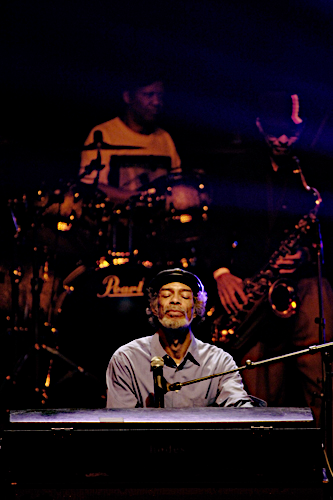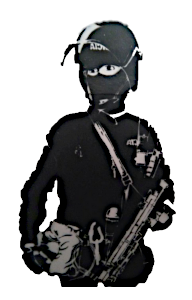The Revolution Will Not Be Televised, by Gil Scott-Heron

Credit: Adam Turner. The image is of Gil Scott-Heron performing at the Regency Ballroom, San Francisco (USA), 2009. Used under CC attribution share-alike 3.0 license
I was riding home the other day, listening to my usual jazz channel on Sirius XM, when this song came on.
I'd heard that title before, but never listened to the music. The song stopped me in my tracks. Obviously I couldn't actually stop the car, because I was driving on a busy road. But the music had my (almost) undivided attention.
Scott-Heron does not 'sing' the words to the song. He speaks them. The Revolution Will Not Be Televised is as much a poem as it is a song. Every word has weight, and the cadence of Scott-Heron's voice drives the significance of the words home. From the first line he addresses us directly and emphatically:
You will not be able to stay home, brother
We are on notice. The following words are repeated as a refrain throughout the piece:
The revolution will not be televised
We are told the revolution will not be fodder for television shows:
There will be no highlights on the eleven o'clock news
The revolution will not be sandwiched in digestible bits between commercial breaks.
The revolution will not be right back
After a message about a white tornado, white lightning or white people
And the revolution will not be virtual:
The revolution will be live
Music is like any art form. No matter the artist's intention, the audience gives it meaning. I know what I got from the song. It was released in 1970, the year I graduated from college. Scott-Heron's cultural references were lifted straight from the headlines, straight from commercial TV (there was no mainstream cable in the U.S.). Scott-Heron tells us in the song:
The revolution will not show you pictures of Nixon
Blowing a bugle and leading a charge by John Mitchell
General Abrams and Spiro Agnew
Richard Nixon, Spiro Agnew, General Abrams, John Mitchell: All represented a corrupt political regime. Nixon with his War on Drugs, Abrams prosecuting the Vietnam War, Agnew (Nixon VP) with his anti-communist Cold War rhetoric (ultimately driven from office amid corruption scandal), and Mitchell (Nixon Attorney General), who aggressively pursued 'violators' of the Drug War and persecuted anti-war protesters.
The video above shows the very day Nixon officially launched the (mass incarceration) 'War on Drugs, (1971). (Two men on that stage would eventually be embroiled in a criminal conspiracy: Nixon himself, who was forced to resign the presidency, and John Erlichman, who actually went to prison. One person not on that stage, but mentioned in Scott-Heron's song, John Mitchell, also went to prison).
I read about this song, and Scott-Heron, when I got home. One of the major points made in the articles consulted is that the song, and Scott-Heron, were precursors to rap. Scott-Heron has even been described as 'the first rapper'. I can see the relationship between The Revolution Will Not Be Televised and rap, but popular rap I hear today actually suffers from most of the distractions-- consumerism and drug use--that, Scott-Heron disavows in his poem. He tells us:
You will not be able to plug in, turn on and cop out
You will not be able to lose yourself on skag and
Skip out for beer during commercials
There is a stanza in The Revolution Will Not Be Televised that does seem to be a progenitor for some politically motivated rap. These lines:
There will be no pictures of pigs shooting down
Brothers on the instant replay

Scott-Heron repeats the line, for emphasis. When I heard that line I thought of J. Dilla's F...the Police. In the song Dilla asks, Now tell me who protects me from you?
While I can see possible heirs to Scott-Heron's art, I can also hear antecedents in The Revolution Will Not Be Televised. I hear Langston Hughes. Listen to Hughes as he 'speaks' his poem, I, Too:
And after Hughes there was James Baldwin, whose legacy I believe also resonates in Scott-Heron's music.
Listen to Baldwin in Staggerlee Wonders:
I think if you trace Hughes (1901-1967), to Baldwin (1924-1987), to Scott-Heron (1949-2011), (and even, much more harshly, to J. Dilla (1974-2006--he died prematurely of complications from lupus), you can see a progression, a continuity of theme, and a deepening of political antagonism.
Maybe I'm hard on rap. Maybe I don't understand it. Maybe I'm too old, of another generation. I listen to Scott-Heron, Langston Hughes and James Baldwin. Wouldn't it be nice to know what Scott-Heron would say about contemporary rap? Well, fortunately, we have a clue.
He is quoted in an interview with the publication Chicken Bones:A Journal (with regard to rap in the 90s):
They need to study music. I played in several bands before I began my career as a poet. There’s a big difference between putting words over some music, and blending those same words into the music. There’s not a lot of humor. They use a lot of slang and colloquialisms, and you don’t really see inside the person. Instead, you just get a lot of posturing
Music is personal. I'm sure most readers here will not agree with my preferences. But just in case some readers are persuadable, I'll leave off with a link to Gil Scott-Heron in, I'm New Here (2010). He performed this the year before he died.
Picture credit not noted in the blog
Police figure:
@muelli from the LMAC Image Gallery, LIL
https://twitter.com/416626589/status/1622437733930000384
The rewards earned on this comment will go directly to the people( @agmoore ) sharing the post on Twitter as long as they are registered with @poshtoken. Sign up at https://hiveposh.com.
Thank you for sharing the portrait of a great musician!
Thank you. I went to sleep last night exploring some of his other music. Interesting person.
What a great songs you have brought us today i loved that they are filled with a lot of meaning, i really recognize a good musician artiist when they do not only say words but poems with melody
Thank you, @malos10,
It was very interesting reading about him. Apparently he was very influenced by Langston Hughes. I've always loved that poet's writing.
Cracking post and song. Amazing moments in American history, and the whole truth hasn't completely come to light. Well written and thought out!
Thank you, @litguru. He's knew to me, but a find :)
I do like the revolution would not be televised. I just listened to it now and the themes agree with me😊
Thanks for bringing the tune..
As for that last comment on rap music. Maybe it's the musicians that he knew back then, for now I think Rap is one of the genres with the most emotional background 😂😂
Thanks for stopping by my friend. I'll have to listen more closely to rap, maybe😇
Indeed